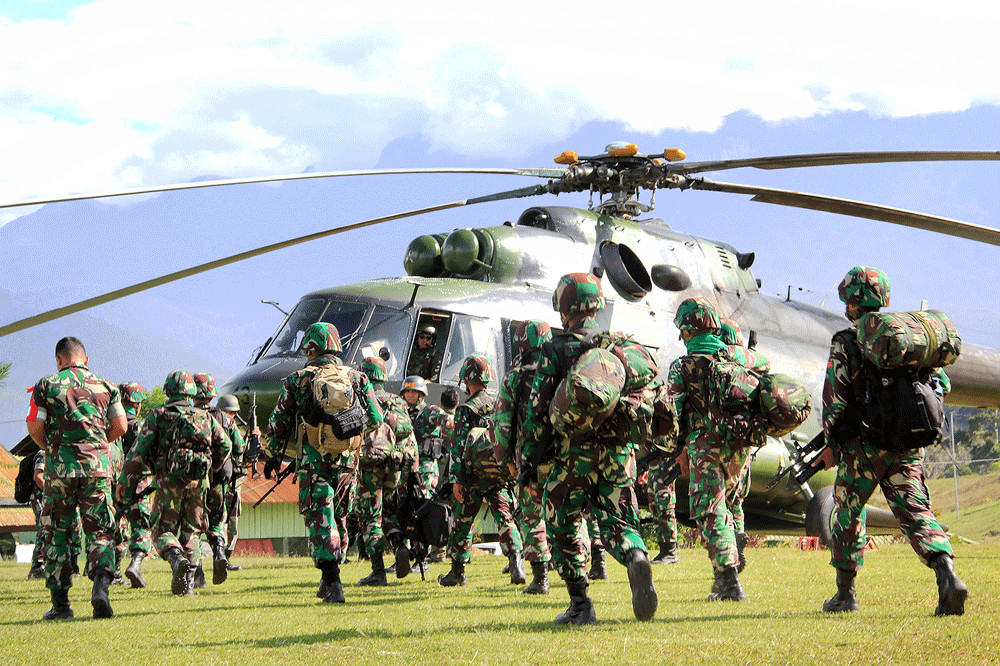Popular Reads
Top Results
Can't find what you're looking for?
View all search resultsPopular Reads
Top Results
Can't find what you're looking for?
View all search resultsIndonesia denies use of chemical weapons in Papua
The government has described as “totally baseless, nonfactual and gravely misleading” a report in an Australian weekly newspaper that alleged the use of chemical weapons in a military operation in Papua.
Change text size
Gift Premium Articles
to Anyone
T
he government has denied a report in The Saturday Paper, an Australian weekly, about the alleged use of chemical weapons in a military operation in Nduga, Papua, calling it “totally baseless, nonfactual and gravely misleading”.
The story was published in the middle of rising tensions between the local administration and central government in the aftermath of attacks by separatists that led to the death of 19 PT Istaka Karya construction workers and one soldier earlier this month.
It features a picture—supposedly taken between Dec. 4 and Dec. 15--of a villager wounded from what some claim was white phosphorus used by the Indonesian Military (TNI) in retaliation for the attacks.
“The troops were going in, heavily armed and with full air support, to teach the West Papuans a lesson. They were going in to kill,” wrote John Martinkus and Mark Davis in The Saturday Paper. They wrote at least seven civilians had died in the operation.
In its response, the Foreign Ministry said that, as a member of the Organisation for the Prohibition of Chemical Weapons (OPCW), Indonesia did not have any chemical agents listed in Schedule 1 of the Chemical Weapons Convention.
Schedule 1 substances are chemicals that can be used as chemical weapons and which have “little or no use for purposes not prohibited” under the convention, such as mustard and nerve agents. These substances may be produced for research, but production of more than 100 grams per year must be declared to the OPCW.
Chemicals that can be used as weapons or in the manufacture of weapons but have legitimate applications as well are listed in Schedule 2 (small-scale applications) and Schedule 3 (large-scale applications).
“Indonesia also imports, uses and stores Schedules 2 and 3 chemical agents for strictly peaceful purposes in supporting national industry, confirmed by no less than 19 OPCW inspections since 2004,” the Foreign Ministry said in a statement on Saturday evening.
The involvement of a military component in the operation, particularly rotary-wing aircraft, the statement continues, was "strictly as an assistance to [the] law enforcement apparatus, and not a military deployment per se in an otherwise internal security [operation]".
The government said the report had “eclipsed the real issue at hand”, which was the mass killing of 19 construction workers on Dec. 2 by the West Papua Liberation Army (TPNPB).
The attacks and the military operation that followed have resulted in high tension in the region, where Papua Governor Lukas Enembe called on President Joko “Jokowi” Widodo to withdraw the troops from Nduga regency, so that the people could celebrate Christmas in peace.
“The presence of Indonesian Army and police personnel in Nduga caused trauma to the community, resulting in them fleeing to the forest,” he said on Thursday, as reported by tribunnews.com.
In response, the Home Ministry said Lukas’ statement violated the Constitution and the Regional Administration Law.
Home Ministry spokesperson Bahtiar Baharudin said Lukas had made a “far-fetched and provocative” argument, and reminded him that, as a governor, he was the representative of the central government in the region and should support the National Police and the TNI in carrying out law enforcement efforts “and guarding every inch of [the country] against armed separatists who committed crimes against humanity.”
He added that, under the Regional Administration Law, Lukas could be dismissed if he was proven to have violated his oath as governor and disobeyed the Constitution and state law.
Earlier, the TNI denied reports that they had used explosives in their hunt for rebels in the area.
Rev. Benny Giay, chairman of the Kemah Injili Church Sinode of Papua, confirmed that five civilians — two in Mbua and three in Yigi — had been killed when security personnel were attempting to retrieve the bodies of the construction workers.
"I'm pretty sure that [explosives] were involved. There were seven [explosions] in Yigi and five on Mount Kabo," he told The Jakarta Post last week.
The government also denied the allegation of the death of the civilians. (evi)










